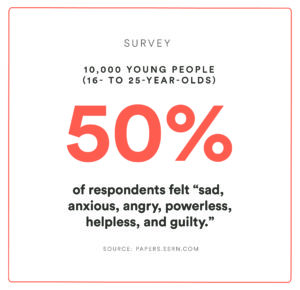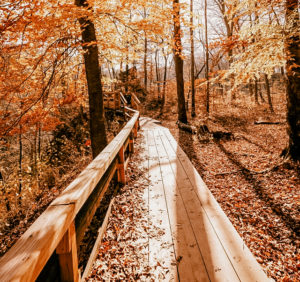Eco-anxiety is becoming increasingly prevalent, especially among young people, and its symptoms range from feelings of panic and grief to guilt and shame about personal choices. As the climate crisis intensifies, this anxiety is likely to get worse, so it is vital the people find methods to cope with it.
Below, we look at what eco-anxiety is, the effect it can have on young people, and several ways to help you cope, including the connection between zero waste and mental health, the importance of getting outdoors, and how to build emotional resilience.
What Is Eco-anxiety?
Eco-anxiety is any form of negative emotional reaction to part or all of the ecological crisis we are currently experiencing. This includes feelings of anxiety or stress around issues such as climate change, mass extinction, pollution, and our current waste generation levels—in short, it is the overwhelming fear of environmental doom.
While not yet a diagnosable condition in its own right, arguably, some of the most commonly identified symptoms include:
- Fatalistic mentality
- Existential dread
- Anger or frustration, particularly toward people who may seem apathetic or inactive
- Guilt and shame about your own carbon footprint / environmental impact
- Feelings of depression
- Feelings of panic
- Feelings of grief for natural environments or wildlife
All of which can, in turn, can cause issues with sleep, appetite, concentration and more.
Moreover, eco-anxiety is disproportionately affecting the youth of the world, with a recent international survey of 10,000 young people (16- to 25-year-olds) finding that over 50% of respondents felt “sad, anxious, angry, powerless, helpless, and guilty.” Additionally, more than 45% of respondents said that these feelings “negatively affected their daily life and functioning,” with researchers concluding that the climate anxiety and distress young people are suffering from threatens both their health and wellbeing.
For those directly experiencing the effects of climate change, a recent article in the British Medical Journal noted that there was a clear “relation between experiencing climate change effects and the increased risks of depression, low mood, extreme mental distress, post-traumatic stress disorder, suicide, and further deterioration in those with a history of mental illness.”
Both the directly and indirectly affected youth of the world are suffering at the hands of climate anxiety, which seems to be having a severe impact on their lives. The problem is one that requires many solutions but trying to personally navigate this anxiety is the first step.
So, how can this be done?
How Are People Navigating Eco-anxiety?
According to the same BMJ article, the best way that young people can alleviate the anxiety felt from climate change is by:
Keeping in mind that these are ways to mitigate eco-anxiety, not climate change itself, let’s look at how each of these four suggestions can be implemented.
1. Connecting with Nature
There is increasing evidence that there is a strong link between being in nature and improved mental health. A 2019 review, for example, found that green spaces near schools promoted cognitive development in pupils while green views near a child’s home promoted self-control behaviors in that child. Some research even goes so far as to suggest that the sounds of nature alone can bring benefits.
With eco-anxiety, which is directly related to worries about the natural world, fighting it through greater individual connection to nature seems like an obvious path.
2. Making Greener Choices at an Individual Level – Zero Waste And Mental Health
It is vital to recognize that tackling the climate crisis won’t solely be the responsibility of individuals, but rather through systemic change. However, greener individual choices can help lead these systemic changes and help lessen the guilt and shame about our own environmental impact that, as mentioned earlier, is considered a major symptom of eco anxiety.
Going zero waste is a great way to make these greener choices, since it is focused on minimizing your impact on the world through the maximization of resources. As the Zero Waste International Alliance (ZWIA) puts it, it is the:
“conservation of all resources by means of responsible production, consumption, reuse, and recovery of products, packaging, and materials without burning and with no discharges to land, water, or air that threaten the environment or human health.”
Essentially, it is one of the “greenest” choices you can make at an individual level and can thus help temper the symptoms of eco-anxiety whilst actively fighting its root causes.
What’s more, moving towards zero waste as an individual, or as a company, enables you to take control of some aspect of the climate emergency. Many of the causes of our eco-anxiety are outside of our control, and trying to control them can exacerbate anxiety disorders. Going zero waste, on the other hand, is all about practical, controllable choices you can start making today.
Additionally, the “side effects” of zero-waste living can also have a beneficial effect on a person’s health and eco-anxiety. For example, a food shopper may opt for unpackaged fruits and vegetables as opposed to heavily processed (and heavily packaged) options, which will, in turn, help improve both physical and mental health.
3. Coming Together with Like-Minded Communities
A social support network can be made up of friends, family, or peers and is vital when dealing with psychological problems such as stress and anxiety. Without one, people can feel isolated and lonely, which can quickly spiral into some of the most severe symptoms of eco-anxiety.
Coming together with a like-minded community reduces these feelings of isolation even further, putting a stop to the nagging “am I the only one?” question that many people may feel in the face of climate apathy.
There are many ways to build this like-minded network, and some ways to get you started are:
- Environmental Volunteering – This will bring you together with like-minded people whilst also allowing you to take an active role in the fight against climate change.
- Take a Class – If you’re more interested in educating yourself about issues, consider taking an in-person or online class in sustainability or other related topics.
- Online Social Networking – In recent years, the possible dangers of social media have become apparent, but they still offer a very simple and highly accessible place to meet with like-minded individuals.
- Go to Topical events – There are many events where you can meet like-minded people, such as beach clean-ups or community gardening days.
4. Building Emotional Resilience and Optimism
Emotional resilience is a person’s ability to adapt to stressful situations, in this case, the environmental crisis. It does not mean “accepting” the situation, but rather having the skills to keep yourself stable whilst fighting against it.
Some of the key ways to stay positive and resilient in the face of turbulent times are to:
Monitor and moderate your internal dialogue. Pay attention to when something happens in the world or in your own life and consider how you react. If you find yourself always anticipating the worst (for example, assuming any climate-positive news has an ulterior motive), or taking a very black-and-white approach to things, you may be accustomed to a negative internal dialogue.
Take notice of your physical health. Everything from your sleep schedule to what and how you eat can affect your mental health. Building up a healthier body with greater physical resilience can in turn help build your emotional resilience and optimism.
Summary
Eco-anxiety is a serious issue that is likely to worsen in the coming years. It disproportionally affects young people, and we are already seeing the devastating impact it is having on their lives. While continuing to fight the broader issues of the climate crisis, people must also look after themselves, and a good place to start is by connecting more strongly with nature, making greener choices at an individual level through zero-waste practices, coming together with like-minded groups, and building emotional resilience and optimism.
If you’re looking to make a difference through your business going zero waste, talk with one of our TRUE Advisors today to see how you can optimize your waste management.








